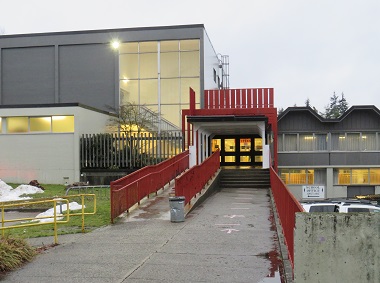
Timothy Que was given permission to start a Catholic Club at Eric Hamber School, but is disappointed with restrictions subsequently imposed.
Public school officials at Eric Hamber Secondary School approved a Catholic Club last fall. A month later they imposed restrictions on what it is allowed to do, following negative public response.
The case raises a number of important questions about the how much religion our secular society can tolerate, especially in public schools.
Among the issues that come to mind:
- What does the BC School Act say about religion?
- Has the approach of public schools changed over the years?
- Is the Vancouver School Board consistent on the issue?
- Do all local School Districts respond in the same way?
- How are Christians interacting with public schools currently?
- Are there Christian/Catholic clubs in public schools these days?
- Are churches allowed to use public schools for church services?
- Is there any Christian group prepared to respond to these issues?
I will deal briefly with some of these issues below; in some cases I have more questions than answers. I would appreciate hearing from anyone who has insights on these matters to contact me so that I can present a more in-depth overview in time.
Renewed faith
 The Catholic Club is the initiative of grade 11 student Timothy Que, who proposed it and took part in a club forum featuring more than 50 groups.
The Catholic Club is the initiative of grade 11 student Timothy Que, who proposed it and took part in a club forum featuring more than 50 groups.
Agnieszka Ruck of The B.C. Catholic interviewed him for a November 15 article:
“The purpose of the Catholic Club is to help people get holier and teach the teachings of the Catholic Church,” Que told The B.C. Catholic.
“It’s going to be hard to teach. I don’t want to water down anything. I want to stand firm in what the Church teaches.”
Que’s pastor, Father Rodney Nootebos, is impressed.
“I’m proud to hear that,” Father Nootebos said in an interview. “It takes incredible courage these days to even say the word ‘Catholic,’ especially in a public school, let alone wanting to help others know the faith and become holy. This is exactly what we need, exclamation point!”
Go here for the full article.
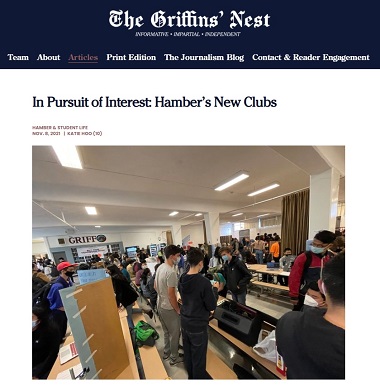 The online version of The Griffins’ Nest, Eric Hamber’s student newspaper, showed students checking out various club possibilities, and listed the Catholic Club first among the possible choices.
The online version of The Griffins’ Nest, Eric Hamber’s student newspaper, showed students checking out various club possibilities, and listed the Catholic Club first among the possible choices.
Catholic Club:
The purpose of the Catholic Club is to share the teachings of the Catholic Church. We will teach numerous things such as the passion of Christ and heaven on a theological basis. We will also be doing activities such as making rosaries, learning and singing gregorian chants, and a Catholic version of jeopardy.
Other clubs featured were Craft Club, Drawing and Painting Club, Language Club, Hamber Operation Smile, Japanese Culture, Mental Health Awareness, Pep Band, Piano Club, Solidarity Not Charity and Writers Club.
Restrictions imposed
The goodwill reflected in The Griffins’ Nest was not shared by all, and before long the school had curtailed the club’s activities. Terry O’Neill wrote about it in The B.C. Catholic:
Public school officials in Vancouver have slapped restrictions on a Catholic students club, preventing the club’s founder from sharing his faith with fellow students.
The officials’ edict means the club will now have to limit its weekly meetings to socializing and general discussion about Catholicism, said Timothy Que, a grade 11 student at Eric Hamber Secondary who started the club this fall with school permission.
“It’s disappointing,” he told The B.C. Catholic. “All I really wanted to do is to just teach Catholic teaching.”
The restrictions were imposed shortly after a November 15 B.C. Catholic story about Que’s initiative. He said he learned that members of the public had contacted the Vancouver School Board to complain about the club. “People were really mad,” Que said. “Someone on Twitter posted about it – negative stuff.”
Former VSB chair Patti Bacchus was one such commentator. On November 16, Bacchus tweeted in response to the story: “I’m pretty sure this does not comply with the B.C. School Act or district policy.”
Go here for the full article. (Bacchus has also been active in opposing tax support for private schools.)
Some questions
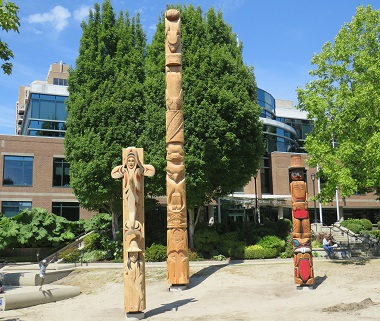
These three carved Indigenous poles were erected in front of the Vancouver School Board offices in 2019.
1. What does the BC School Act say about religion?
Section 76 of the BC School Act does address the issue:
76 (1) All schools and Provincial schools must be conducted on strictly secular and non-sectarian principles.
(2) The highest morality must be inculcated, but no religious dogma or creed is to be taught in a school or Provincial school.
2. Has the approach of public schools changed over the years?
It certainly has. I remember my home room teacher leading us in the Lord’s prayer in the late 1960s. As well, I have heard many stories of Christian clubs being allowed more latitude over the years. I recently heard the testimony of a young pastor who said the Christian club he joined in a Vancouver high school changed the course of his life.
3. Is the Vancouver School Board consistent on the issue?
Definitely not. As I wrote on this site, “The [June 19, 2019] celebration of three carved Indigenous poles right in front of the School Board offices shows how open to spirituality the system can be, when it comes in certain forms.”
No doubt my headline – “School Board’s interpretation of ‘secular and non-sectarian’ could be good news” – was naive. I said:
Perhaps Christians can legitimately expect to gain a more sympathetic hearing for their views and practices within the public school system, if not from die-hard secularists, then from others in our increasingly diverse culture.
The Vancouver School Board has welcomed a deeply non-secular cultural expression onto its very doorstep. As Christians interact with the VSB in future, should they not be able to receive an equally warm welcome?
Crosses on the front lawn are unlikely (and not likely to be requested). A respectful recognition of the value of our Christian heritage and the importance of interplay between sacred and secular to our daily lives would suffice.
Go here for the full article.
4. Do all School Districts respond in the same way?
No, each has its own procedures. For example, the North Vancouver School District appears to be even less tolerant than Vancouver. Their Policy 405 states:
5. How are Christians interacting with public schools currently?
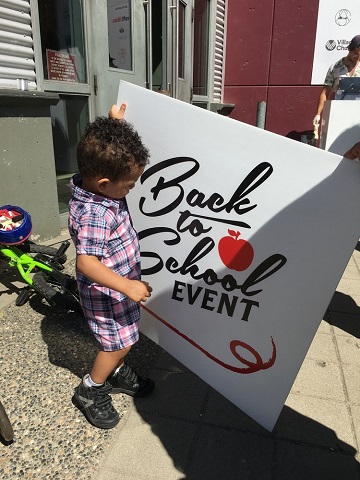
City Dream Center regularly helps public schools. Image from site.
Many churches are working hard to become more involved in their neighbourhoods, and that includes their local public schools. Many ministries also help out.
For example, City Dream Center runs a very active ‘Adopt a School’ program which involves food hampers, nutrition support and much more. Others offer tutoring in public schools, daily support for disadvantaged students, etc.
Some ministerials have gone out of their way to meet with and support public school officials.
6. Are there Christian/Catholic clubs in public schools these days?
I should know more about this. There certainly have been Christian clubs in many schools over the years. I am not sure whether groups like Young Life, Youth Unlimited and 604 Network actually work in public schools.
Many individual Christian teachers have initiated or been involved with Christian clubs over the years.
I do wonder what the fate of a Christian club would have been at Eric Hamber. Such a club, involving Christians of all backgrounds, could not have been described as denominational or sectarian. (I’m not sure that would have fit with Timothy Que’s vision however.)
7. Are churches allowed to use public schools for church meetings?
Last I heard, yes. Tenth Church was at Kitsilano Secondary for years, as one example. I would love to hear from people who are meeting in public schools, or who have been denied permission to meet there.
8. Is there any Christian group prepared to respond to these issues?
Sadly, I don’t think so. At least I have not heard of any coordinated efforts to respond. Understandably, church leaders are hesitant to enter the fray, given that Christian views were uncritically favoured (at least as recently as my day) and because several of the mainline denominations have been so damaged by stories of residential schools.
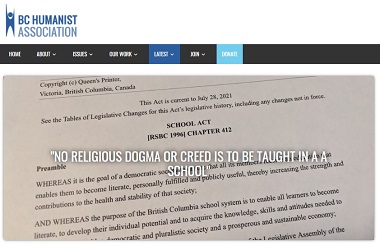 However, in my view there is no reason whatsoever that Christians should not be offering a creative and united response to issues such as the proper place of religion in public schools.
However, in my view there is no reason whatsoever that Christians should not be offering a creative and united response to issues such as the proper place of religion in public schools.
It is worth noting that Ian Bushfield, Executive Director of the BC Humanist Association, was right on top of the situation, with a December 8 comment, using a portion of Section 76 of the School Act as the header.

The requirements of the BC School Act clearly refers to what is being taught in the school, in the curriculum and otherwise, and should not me extended to student clubs or extracurricular activities of those student-led clubs.
This is a principle and a distinction that needs to be established in law, and either churches collectively or Christian legal professionals/agencies should work the matter through until it is so.
I see what is currently happening as overreach by school boards and there should exist legal parameters that prohibit boards from such interference with individual rights and freedom of speech and association.
Two related topics come to mind:
A) The BC Charter gives parents, not the government, the primary responsibility for the education of their child.
B) Freedom of speech – not religious freedom – is what is really at stake here. It seems that the public school should steer clear of teaching religion and provide a broad academic equipping. However, all students should be encouraged to lead, speak and explore the views and ideas they have. This is good preparation for leadership and has always been at the core of educational institutions.